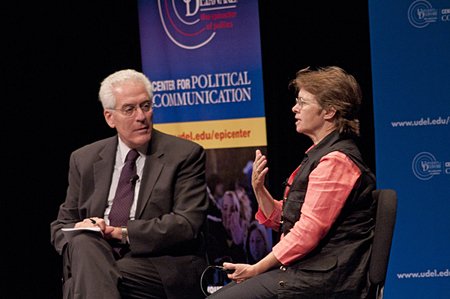CPC Afghanistan : Mess in Afghanistan
Washington Post editor discusses effects of America’s longest war

Corruption, tribalism and a resurgent Taliban threaten to undo any gains made in Afghanistan during America’s longest war, the Washington Post’s Pamela Constable told a University of Delaware National Agenda speaker series audience Wednesday night, Oct. 5, in Mitchell Hall.
Constable, deputy foreign editor at the Post, has spent much of the last decade in Afghanistan and neighboring Pakistan and returned from South Asia just a few days before the presentation. The outlook in Afghanistan, she said, is bleak.
As the U.S. and the international community begin to withdraw, it is possible the Taliban will reassert itself or that the country will default to ancient power systems in which warlords hold sway. “The worst fear,” Constable said, “is civil war between the major ethnic groups.”
The U.S. faces a difficult choice, she said, because “we’re damned if we stay and damned if we leave.” But, she said, as “fears trump progress,” it is hard to make the argument for continued involvement.Five years ago, and certainly 10 years ago, Constable said her views were much different.
With American involvement and the fall of the Taliban following the September 2001 terrorist attacks, Constable said journalists witnessed “a promising period of rebirth” in a “very poor country that suddenly was important to the United States.”
Arriving in the capital of Kabul that year, she said, they found a festive atmosphere with joyous Afghans firing guns into the air in the streets.
Westerners were “under the false illusion that everything would change,” she said, that women would throw off their burqas and that rock music would be played. And while some of that did occur, Afghanistan is largely an extremely conservative tribal country and not terribly interested in that sort of change.
Constable said that what Afghans disliked about the Taliban regime was not the values they espoused but, as a farmer told her, “They were forcing us to do something we were already doing.”
Still, Constable said the early years of American involvement showed promise with the “rebirth of a society” that included political and economics possibilities, a return of expatriates to what had become something of a “ghost country” and the return of students to school.
Roads, schools and health clinics were built, elections were held and a constitution was enacted. The times of hope lasted about five years, she said, noting that while Afghanistan was rebuilding, so was the Taliban. In 2006 the Taliban reemerged “in a big way” and with a “fierce will to defeat the government.”
Given a weak and corrupt government, the Taliban continues to grow in strength and influence.
The hope, Constable said, was that American allies in Afghanistan would provide a bulwark against the forces of evil but that is not happening.
Adding to the problem is the tribalism of Afghanistan, where people see the world through the prism of their tribe, or even their family, without a view to building a unified nation.
Too many are willing to turn international aid to personal advantage, Constable said, adding, “Only a place like Afghanistan can turn an optimist into a cynic.”
South Asia
Constable said South Asia is an extremely important region with a large Muslim population and several nations with nuclear weapons. One of those, Pakistan, borders China, Iran and India.
One of the real fears in the region is not as much that it will foment war between East and West but that war within Islam will spill over to the West, Constable said.
She said she believes the best thing the U.S. can do is work to shore up moderate, mainstream Muslim societies.
That will not be easy, as Constable said sentiment toward Americans in both Afghanistan and Pakistan — where U.S. cause for celebration upon the death of Osama bin Laden at the hands of Navy SEALS was perceived by Pakistanis as a great humiliation — is at a low point.
Change can come, Constable said, but it will have to be incremental.
National Agenda series
The 2011 National Agenda speaker series, sponsored by the Center for Political Communication, is titled “Girding for Battle: Political Movers and Shakers at the University of Delaware.”
National Agenda lectures are held at 7:30 p.m. Wednesdays, continuing through Nov. 16. Lectures are held in Mitchell Hall and moderated by Ralph Begleiter, director of the Center for Political Communication.
The series will continue Wednesday, Oct. 19, with political ad campaigners Joe Slade White and Valerie Biden Owens; Nov. 2, with political watchdog Melanie Sloan; and Nov. 16, with New Jersey Gov. Chris Christie, a UD alumnus.
